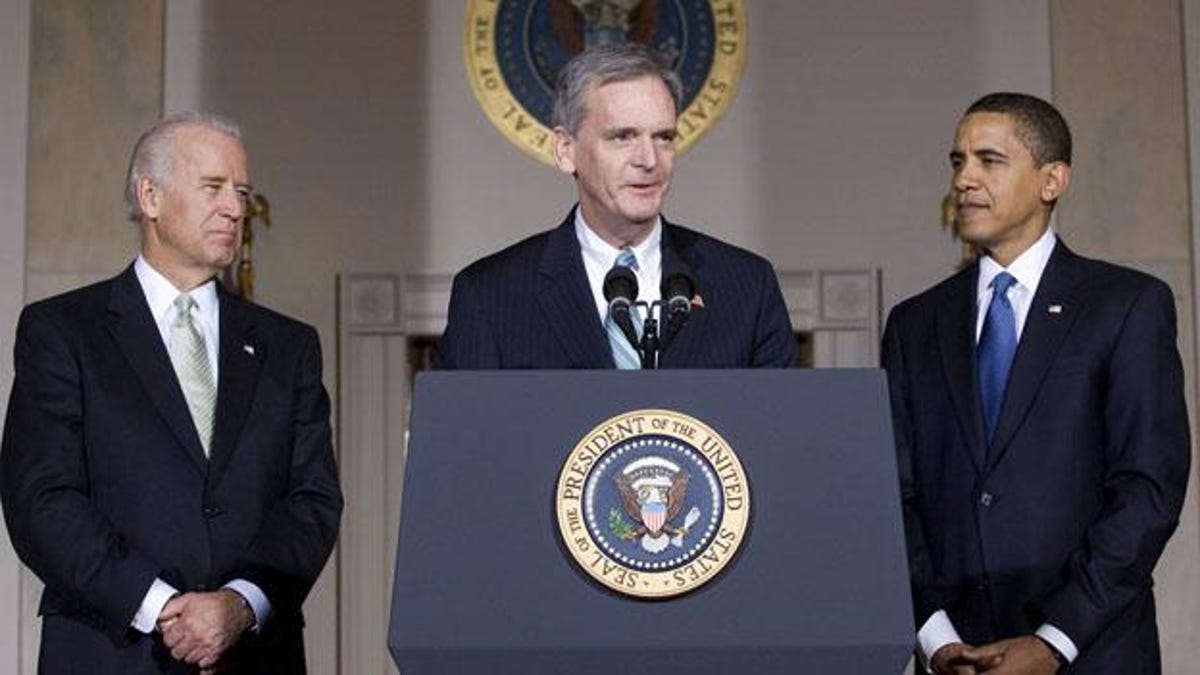What Judd Gregg bodes for high tech
President Obama's pick for commerce secretary has sided with business groups on Internet taxes and H-1B visas--and the FBI regarding encryption.

Republican senator Judd Gregg on Tuesday officially became President Obama's nominee for secretary of commerce, bringing a pro-business and pro-law enforcement record to a cabinet position with significant influence over the new administration's technology policies.
In remarks at the White House, Obama called the New Hampshire senator "an outstanding addition to the depth and experience of my economic team, a trusted voice in my Cabinet, and an able and persuasive ambassador for industry who makes it known to the world that America is open for business."
A review of Gregg's actions as senator shows that his record on technology policy is mixed. His skepticism of Internet taxes and support for more H-1B visas has made him a frequent ally of the tech industry, but he was the first -- and only -- senator to call for a global ban on secure encryption products after the September 11, 2001 attacks.
The U.S. Department of Commerce oversees the administration's position on Internet regulation, the patent office, and tech-related standards including an algorithm used in digital signatures. Commerce's National Telecommunications and Information Administration calls itself the "president's principal adviser on telecommunications and information policy issues." In addition to its traditional involvement with Internet governance, NTIA is responsible for overseeing the coupon program for digital TV converter boxes.
Because Commerce oversees regulations relating to the Web posting and export of encryption code, Gregg's pro-surveillance views are causing a bit of nervousness in Washington circles. On the Senate floor on September 13, 2001, while the World Trade Center complex was still smoldering, Gregg said: "This is something that we need international cooperation on and we need to have movement on in order to get the information that allows us to anticipate and prevent what occurred in New York and in Washington."
Gregg said that encryption makers "have as much at risk as we have at risk as a nation, and they should understand that as a matter of citizenship, they have an obligation" to include decryption methods for government agents. Gregg, who previously headed the appropriations subcommittee overseeing the Justice Department, then told the Associated Press he was writing legislation "to give our law enforcement community more tools."
That proposal echoed legislation approved by one House of Representatives committee four years earlier, which would have made it a felony to distribute or sell encryption products unless they provided police with "immediate access to plaintext." That would have prohibited the distribution of Web browsers with built-in SSL encryption, operating systems with disk encryption, and software using standard Internet protocols including IPsec and SSH.
A month later in October 2001, without explanation, Gregg abandoned the legislation he was drafting.
"We are hopeful that as Commerce Secretary, Sen. Gregg will not revive the discredited idea of limiting the use of strong encryption," Greg Nojeim, senior counsel at the Center for Democracy and Technology, said on Tuesday. "Requiring a backdoor in encryption systems to help the government conduct surveillance would create vulnerabilities that would ultimately make us less, not more, secure."
A friend of the business community
In other areas and in other ways, though, Washington representatives of the high tech industry say Gregg is a solid choice.
The Business Software Alliance said the senator "has the potential to be an outstanding Secretary of Commerce." The Information Technology Industry Council said: "He has been a strong proponent of opening overseas markets to U.S. exports, he backed a permanent R&D tax credit and has voted favorably on litigation reform."
Gregg has been a friend of the business community, receiving a cumulative score of 88 percent in the U.S. Chamber of Commerce's most recent congressional scorecard. (By comparison, Obama received a 42 percent rating, and Vice President Joe Biden a mere 35 percent.) On CNET's 2008 scorecard that rated a broader range of votes including ones relating to gambling and wiretaps, Gregg received a 50 percent.
He has been a champion of eliminating any limits on H-1B "guest worker" visas, telling Microsoft's Bill Gates in 2007 that he "agreed 100 percent" that there should be no limits on them. Gregg acknowledged that his colleagues would not be inclined to support such a radical proposal; he introduced legislation last year raising the limit on H-1B "guest worker" visas from 65,000 to 115,000 and the advanced-degree exemption to 30,000 visas for the next three years.
Gregg has also suggested making it illegal to sell someone's Social Security number without their consent, and has consistently supported efforts to restrict Internet taxes.
The news of Gregg's nomination comes a day after the Senate confirmed Eric Holder as attorney general. Holder supported laws mandating Internet traceability, limits on domestic use of encryption, and restrictions on free speech online; during his confirmation hearing last month he said the president has inherent wiretapping and surveillance authority that "cannot be infringed by the legislative branch."
CNET's Stephanie Condon contributed to this report

